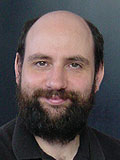Martin Fowler, ThoughtWorks

I'm an author, speaker, consultant and general loud-mouth on software development.
I concentrate on designing enterprise software - looking at what makes a good design and what practices are needed to come up with good design. I've pioneered object-oriented technology, refactoring, patterns, agile methodologies, domain modeling, the Unified Modeling Language (UML), and Extreme Programming.
I'm the Chief Scientist at ThoughtWorks - an international application development company. I've written five books on software development: Analysis Patterns, UML Distilled (now in its 3rd edition), Refactoring, Planning Extreme Programming (with Kent Beck), and Patterns of Enterprise Application Architecture. I also write articles regularly on my site at Martin Fowler.





